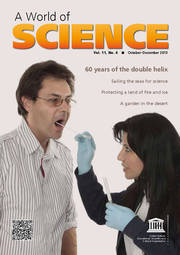Vol 6 N° 2 [April–June 2008]
CONTENTS
IN FOCUS
p 2 What future for geo-education in Africa?
NEWS
p 9 Launch of Archaeomap
p 9 Education project targets HIV/AIDS prevention in Africa
p 10 Health dominates L’ORÉAL–UNESCO awards
p 12 A year to discover the Universe
p 12 Biosphere reserves have a roadmap for next six years
p 13 An international centre for karst research in China
p 13 Digest analyses private versus public education spending
p 14 UNESCO and Inmarsat to improve tsunami warning system
INTERVIEW
p 15 Khady Nani Dramé on why peasant rice farmers need no longer sustain heavy losses in times of drought
HORIZONS
p 17 The art of engineering a better world
p 20 A bad year for Caribbean corals
IN BRIEF
p 24 Diary
p 24 New releases
Quick link to Vol. 6 n°2 (PDF document)
See also ARCHIVES for A World of Science
EDITORIAL
Don’t miss the boat
There is a date which should be in the diary of every country with a coastline: 13 May 2009. This is the deadline for countries wishing to submit a claim for the extension of their legal continental shelf.
Article 76 of the UN Convention on the Law of the Sea provides the international legal framework for states to exercise their rights and duties in the use of the ocean and its resources. In particular, the Convention delimits territorial waters and other maritime zones, exclusive economic zones and extended continental shelves.
Coastal states which signed the Convention before 1999 have the right to claim seabed resources beyond 200 nautical miles seaward of their low-tide line until 13 May 2009. They have the chance to submit a claim to the UN Commission on the Limit of the Continental Shelf to extend their continental shelf up to 350 nautical miles (ca. 650 km).
When you consider that offshore oil and gas today provide one-quarter of world production and account for about the same proportion of known reserves, it is easy to see why coastal states around the world are scrambling to meet this deadline. Deep-water drilling is regularly turning up important new resources: oil fields, gas hydrate deposits, minerals and extremophiles – those uncanny organisms from the ocean depths which offer such exciting possibilities for pharmaceuticals and other industries.
One continent, however, seems largely oblivious to the impending deadline. Although 33 of Africa’s 39 coastal states have signed the Convention, only Ghana, Kenya, Madagascar, Namibia, Nigeria, South Africa and a handful of others are actively delineating their legal continental shelf as the deadline approaches. This is worrying because the continental shelf is not an automatic jurisdiction, unlike other zones. To be endorsed, claims need to be accompanied by scientific proof of the natural extension of terrestrial land into the sea.
In an attempt to salvage the situation, the NEPAD Coastal and Marine Coordinating Unit teamed up with UNEP and UNESCO’s Intergovernmental Oceanographic Commission in December 2006 to try to fast-track the process in Africa. Ever since, the group has been taking its message to the most important Pan-African fora, including the African Union Summit in Addis Ababa (Ethiopia) in January last year. In the next issue of A World of Science in July, there will be a follow-up article to the present editorial explaining what making a submission entails.
Supposing a large number of coastal African countries do make the deadline, what then? As the authors of the article on geo-education argue overleaf, ‘African countries should also ask themselves if they dispose of the geoscientists, equipment and strategies to seize this exciting opportunity if and when their claims to the continental shelf are validated.’
W. Erdelen Assistant Director-General for Natural Sciences

